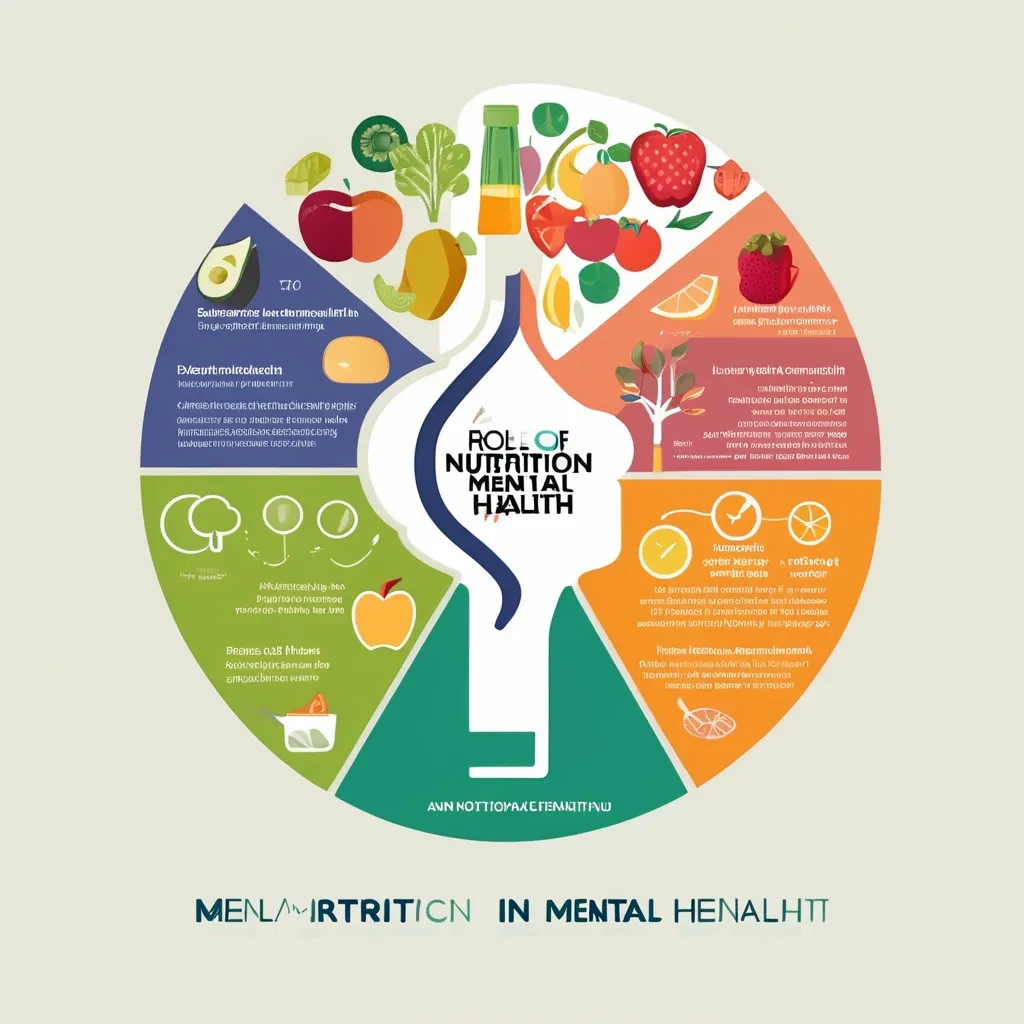In recent years, the connection between nutrition and mental health has gained significant attention in both scientific research and public discourse. While we often think of nutrition in terms of physical health, emerging studies reveal that what we eat can profoundly impact our mental well-being. This blog post explores the intricate relationship between nutrition and mental health, highlighting the key nutrients, dietary patterns, and lifestyle changes that can foster emotional resilience and cognitive function.

Understanding the Gut-Brain Connection
One of the most compelling areas of research is the gut-brain axis, which illustrates the communication network between the gut and the brain. The gut is home to trillions of microorganisms, collectively known as the gut microbiome. These bacteria play a crucial role in digestion, but they also influence brain function and mental health.
Studies have shown that a healthy gut microbiome can enhance mood and cognitive function, while an imbalanced microbiome may contribute to anxiety, depression, and other mental health disorders. This connection underscores the importance of a diet rich in prebiotics and probiotics, which can promote a healthy gut environment.
Key Nutrients for Mental Health
- Omega-3 Fatty Acids: Found in fatty fish like salmon, walnuts, and flaxseeds, omega-3 fatty acids are known to play a critical role in brain health. Research suggests that these fats can reduce symptoms of depression and anxiety, likely due to their anti-inflammatory properties and their role in neurotransmitter function.
- B Vitamins: B vitamins, particularly B6, B12, and folate, are essential for brain function and mental health. They help regulate mood-related neurotransmitters such as serotonin and dopamine. Deficiencies in these vitamins have been linked to increased risks of depression and cognitive decline. Foods rich in B vitamins include leafy greens, legumes, eggs, and fortified cereals.
- Vitamin D: Often referred to as the “sunshine vitamin,” vitamin D plays a significant role in mood regulation. Low levels of vitamin D have been associated with an increased risk of depression. Sources of vitamin D include sunlight exposure, fatty fish, fortified dairy products, and supplements.
- Antioxidants: Foods rich in antioxidants, such as fruits and vegetables, help combat oxidative stress, which can negatively impact brain health. Berries, nuts, dark chocolate, and green leafy vegetables are excellent sources of antioxidants that can support cognitive function and emotional well-being.
- Amino Acids: Amino acids are the building blocks of proteins and play a key role in producing neurotransmitters. For instance, tryptophan is an amino acid that converts to serotonin, a neurotransmitter that regulates mood. Foods high in protein, such as lean meats, dairy, nuts, and legumes, can help ensure a sufficient intake of essential amino acids.

Dietary Patterns That Support Mental Health
While individual nutrients are important, dietary patterns can provide a more comprehensive approach to mental health. Several studies have highlighted specific diets that promote emotional well-being:
The Mediterranean Diet
The Mediterranean diet, characterized by high consumption of fruits, vegetables, whole grains, legumes, nuts, and healthy fats, has been associated with reduced symptoms of depression and anxiety. This diet emphasizes anti-inflammatory foods and is rich in omega-3 fatty acids, antioxidants, and fiber, all of which contribute to brain health.
The DASH Diet
Originally designed to combat hypertension, the DASH (Dietary Approaches to Stop Hypertension) diet emphasizes whole foods, such as fruits, vegetables, whole grains, lean proteins, and low-fat dairy. Research indicates that adherence to the DASH diet may also be linked to lower levels of depression.
Plant-Based Diets
A growing body of evidence suggests that plant-based diets can positively impact mental health. These diets, which are rich in fruits, vegetables, whole grains, and legumes, provide essential nutrients that support brain function. Studies have shown that individuals following plant-based diets often report lower levels of anxiety and depression.

Lifestyle Factors That Influence Nutrition and Mental Health
Nutrition is just one piece of the puzzle when it comes to mental health. Lifestyle factors, such as physical activity, sleep quality, and stress management, also play critical roles.
Physical Activity
Regular physical activity has been shown to improve mood and reduce symptoms of anxiety and depression. Exercise promotes the release of endorphins and serotonin, both of which enhance feelings of well-being. Moreover, a physically active lifestyle can improve dietary habits by increasing energy levels and motivation to eat healthily.
Sleep Quality
Sleep and mental health are closely intertwined. Poor sleep can lead to a variety of mental health issues, including anxiety and depression. A balanced diet can improve sleep quality by regulating hormones that affect sleep patterns. Foods like cherries, almonds, and oatmeal can promote better sleep when incorporated into an evening routine.
Stress Management
Chronic stress can wreak havoc on both mental and physical health. Nutrition plays a role in stress management; certain foods can help mitigate stress responses. For instance, magnesium-rich foods (such as leafy greens and nuts) can help regulate cortisol levels, a hormone associated with stress.
Practical Tips for Enhancing Nutrition and Mental Health
- Plan Balanced Meals: Aim to include a variety of nutrient-dense foods in your meals. Focus on whole foods, such as fruits, vegetables, whole grains, lean proteins, and healthy fats.
- Stay Hydrated: Dehydration can affect mood and cognitive function. Ensure you’re drinking enough water throughout the day.
- Mindful Eating: Practice mindful eating by paying attention to your hunger cues and savoring your food. This can enhance your relationship with food and improve digestion.
- Limit Processed Foods: Highly processed foods, often high in sugar and unhealthy fats, can negatively impact mood and energy levels. Try to limit these in your diet.
- Seek Professional Guidance: If you’re struggling with mental health issues, consider consulting a registered dietitian or mental health professional who can provide personalized advice and support.
Conclusion
Nutrition plays a pivotal role in mental health, influencing everything from mood regulation to cognitive function. By understanding the impact of specific nutrients and dietary patterns, we can make informed choices that promote emotional resilience and overall well-being. While dietary changes alone may not be a cure-all for mental health conditions, they can be a powerful component of a holistic approach to mental wellness. As we continue to unravel the complexities of the gut-brain connection, it becomes increasingly clear that taking care of our bodies can be a significant step toward nurturing our minds.




Pingback: Most profitable niche to start in 2025. - Knowledge kendra
Mast hai
Pingback: Every Home Should Have in a First Aid Kit - Knowledge kendra
Pingback: Best Medical Courses After Class 12th - Knowledge kendra
Pingback: Nancy Pelosi Hospitalized: What Happened During Her Trip to Luxembourg? - Knowledge kendra